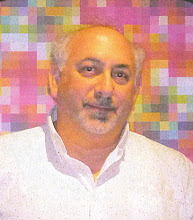I learned to read at a younger than usual age (for that time, at least), and when I was still a child we moved for a couple of years to Morocco, where I learned to speak French (how fluently at age 7 is questionable). Instantly, my mother declared that I was a whiz at languages. I then learned enough Hebrew for my bar mitzvah. A year later I took German for one year from a stunning German blonde emigre I fell in love with. Then we moved to a place where the schools didn't offer German--and I was told I had already fulfilled my entire language requirement for graduation so I stopped learning a foreign language. Before entering college, I spent several weeks in a Hebrew "ulpan" (intensive language course) and continued studying that language for a couple of years, never becoming fluent but achieving slightly more proficiency with it than my supposed fluency in French (tell that to the French people I tried speaking with last time I was there).
Of course, I've had the chance to visit a number of foreign countries and to familiarize myself with the basic tourist phrases you should say prior to lapsing into English and expecting them to understand you. Hello, please, thank you, goodbye, toilet, etc. Never more than a handful of words, of course (though it's always practical but depressing to discover how many English words are used in other tongues these days).
Twenty years ago, the International Theatre Institute of the U.S. sent me to Seoul, Korea for some research and exchange purposes. I'll save the long version of the story for another post (or series of posts). But one night, I was taken out on the town by some Korean theatre artists, and by the end of the night (and after a few drinks, I'll admit), I insisted that they teach me a dirty word in Korean--but that it should be only one word, the worst possible word, since it was unlikely I could remember several. After great deliberation, they taught me that word. Upon my return, I was talking with a Korean-American playwright I knew and telling her this story. "There are no dirty words in Korean," she said. I then spoke the word I had learned. "Except that one," she replied.
As a result, one of my great ambitions became to learn one dirty word in every language I encounter. I don't exactly apply myself diligently to this endeavor, so I haven't amassed a voluminous collection of foul language. But there's no denying that knowing one can be as essential a tool to the foreign visitor as any of the other phrasebook words we memorize before our trips.
Until next time...
Rick
Tuesday, February 26, 2008
Subscribe to:
Post Comments (Atom)


No comments:
Post a Comment